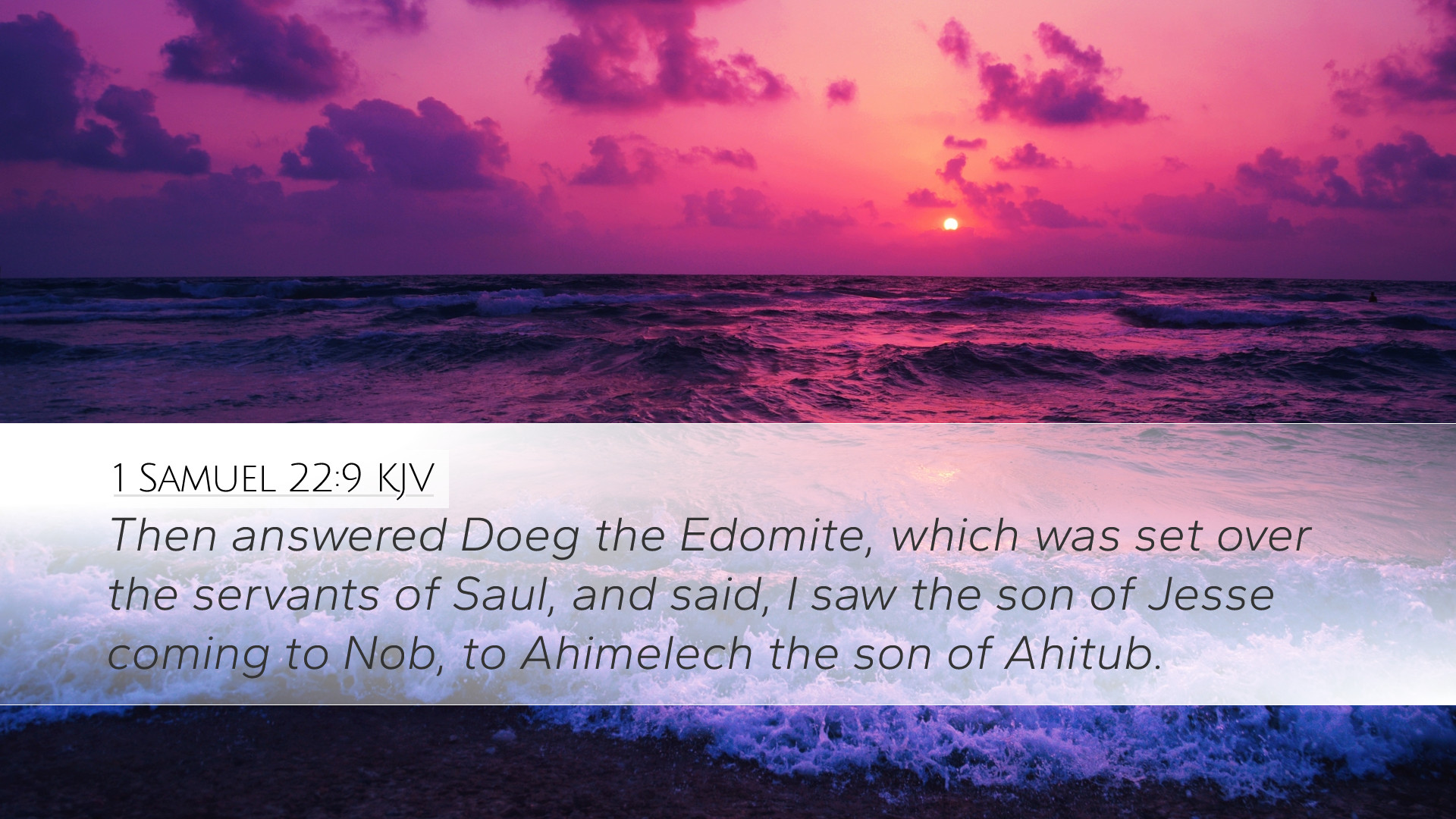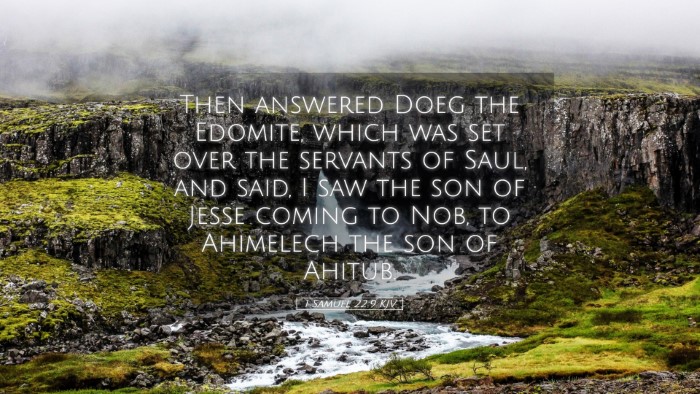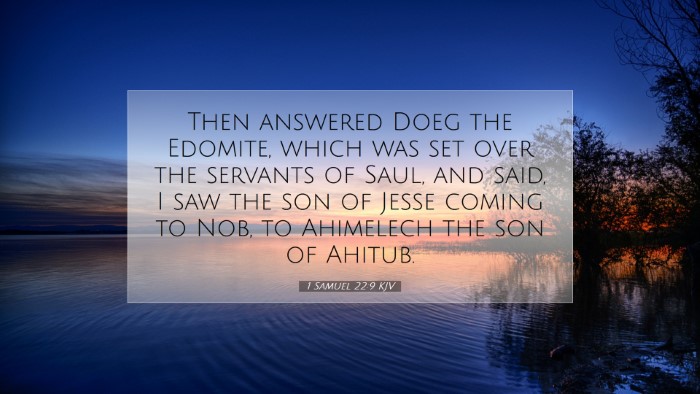Commentary on 1 Samuel 22:9
Verse: "Then answered Doeg the Edomite, which was set over the servants of Saul, and said, I saw the son of Jesse coming to Nob, to Ahimelech the son of Ahitub."
Introduction
This verse captures a critical moment in the narrative of 1 Samuel, where Doeg the Edomite reveals information to King Saul about David’s whereabouts. It serves as a pivotal point that leads to dire consequences for Ahimelech the priest and the people of Nob. In this commentary, insights from Matthew Henry, Albert Barnes, and Adam Clarke will be blended to provide a deeper understanding of this passage.
Contextual Background
The events surrounding this verse take place during the rise of David and the escalating tension between him and Saul. David, having fled from Saul, seeks refuge with Ahimelech, the priest at Nob, who provides him with sustenance and Goliath’s sword. Meanwhile, Doeg, a servant of Saul, is present and witnesses this interaction. The significance of his testimony cannot be overstated, as it marks the beginning of the tragic fate for Ahimelech and the priests.
Analysis of Doeg's Role
Doeg, described as an Edomite and a servant of Saul, represents treachery and malice. His willingness to inform Saul about David's whereabouts strikes at the heart of loyalty and betrayal.
- Character of Doeg: Doeg's character can be characterized by his ambition and his role as an informant. Both Matthew Henry and Albert Barnes emphasize that Doeg, despite his lowly status, seeks favor by betraying the innocent.
- Motivation: The motives behind Doeg’s actions are often scrutinized. It can be inferred that his eagerness to please Saul outweighs any semblance of loyalty to David or the priesthood, highlighting his shrewdness in political maneuvering as noted by Adam Clarke.
- Consequences of Informing Saul: The information conveyed by Doeg sets off a tragic chain of events, including the massacre of the priests at Nob. This act of betrayal is a stark reminder of the dangers of political intrigue and the vulnerability of those in positions of trust.
The Significance of David’s Arrival at Nob
David visiting Ahimelech can also be seen as significant. It illustrates his desperation and need for assistance, yet it also highlights his faith in God’s provision through others.
- David’s Dependence: The fact that David sought food and weaponry suggests an acute awareness of his circumstances and a reliance on divine providence through Ahimelech. This dependence is a recurring theme in David’s life, pointing to his spiritual journey and ultimate trust in God.
- Ahimelech’s Innocence: Ahimelech acted with good intentions, offering help in good faith. His actions remind readers of the consequences that often arise from innocent gestures in a world rife with suspicion and hostility.
Theological Insights
This verse and its surrounding narrative invite considerations on themes of divine justice, the complexities of human motives, and the providence of God in dire circumstances.
- Divine Providence: Matthew Henry comments on how God can weave seemingly tragic events into a larger tapestry of His plan. The betrayal leading to the priest’s death ultimately serves to heighten David’s narrative and God’s unfolding covenantal purposes.
- Human Betrayal: The betrayal by Doeg serves as a potent reminder of the treacherous nature of political alliances and the importance of integrity among God’s people, as emphasized by Albert Barnes.
- Justice and Judgment: The narrative encourages reflection on God’s justice. The destruction of Nob and the priests reflects the serious consequences of sin and the moral ramifications of choices made by individuals, as articulated by Adam Clarke.
Lessons for Today
This passage invites modern readers, especially pastors and theologians, to grapple with the nature of loyalty, betrayal, and God's providence.
- Importance of Accountability: The role of Doeg emphasizes how individuals in positions of power can misuse their influence. Christian leaders must be vigilant against the temptations of ambition at the expense of righteousness.
- Provision in Difficulty: Like David, believers might encounter challenges that compel them to seek help from others. This should foster a deeper dependence on God and prompt a commitment to be channels of support to others.
- Moral Integrity: Ahimelech’s actions prompt discussions about moral integrity. Faith-filled choices often lead to unforeseen consequences, highlighting the need for discernment in a world marked by deceit and unfaithfulness.
Conclusion
1 Samuel 22:9 serves not only as a historical account but as a profound reflection on human nature, divine sovereignty, and the unfolding of God’s plan amidst trials. It challenges readers to consider their own loyalties, the nature of their decisions, and the overarching guidance of God in all circumstances.


